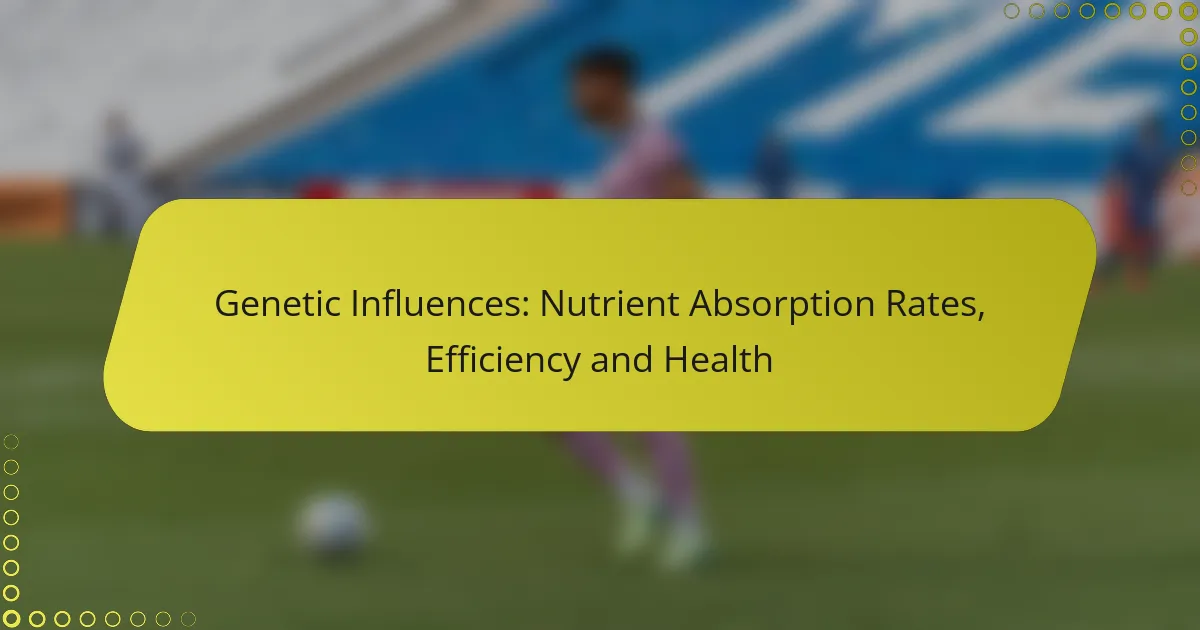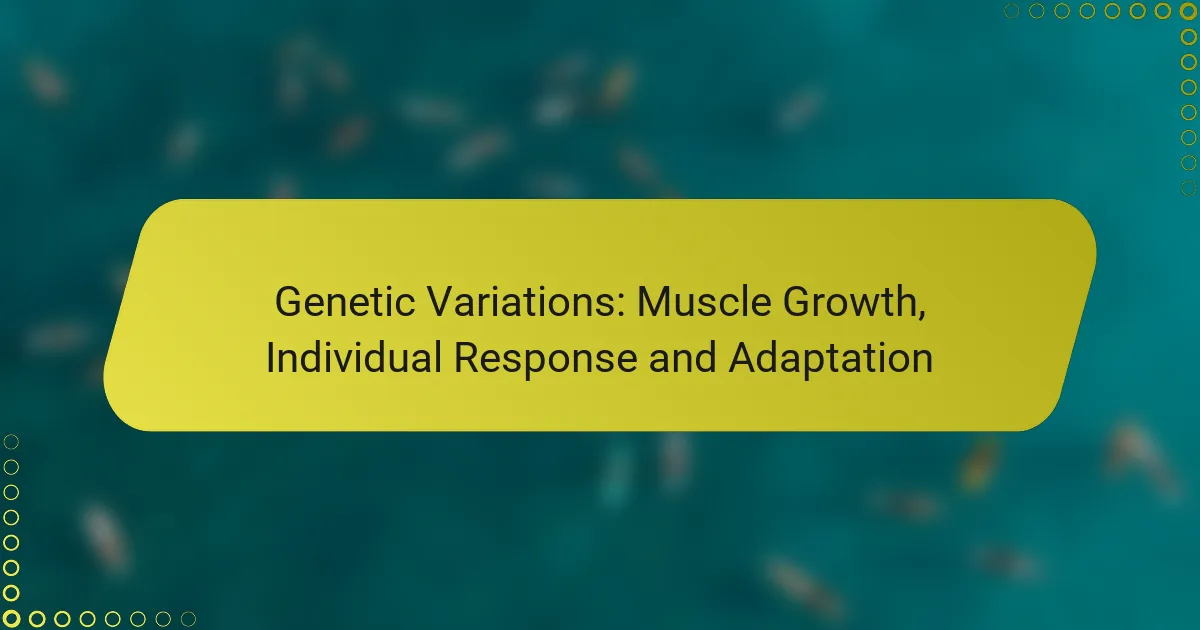DNA plays a crucial role in weight loss success by affecting metabolism, appetite, and body composition. By understanding genetic influences on body types and predispositions, individuals can personalize their weight loss strategies for more effective results. DNA testing offers valuable insights that help tailor approaches to align with one’s unique genetic makeup, enhancing overall weight loss efforts.

How Does DNA Influence Weight Loss Success?
DNA plays a significant role in determining weight loss success by influencing factors such as metabolism, appetite, and body composition. Understanding these genetic factors can help individuals tailor their weight loss strategies for better outcomes.
Genetic predisposition to weight gain
Genetic predisposition refers to inherited traits that can make some individuals more susceptible to weight gain. Certain genes can affect how fat is stored, how calories are processed, and how the body responds to exercise. For instance, variations in the FTO gene have been linked to increased body mass index (BMI) and obesity risk.
Recognizing these genetic factors can help individuals understand their unique challenges in weight management. However, genetics is just one piece of the puzzle, and lifestyle choices also play a crucial role.
Impact of metabolism-related genes
Metabolism-related genes influence how efficiently the body converts food into energy. Variations in genes such as UCP1 and ADRB2 can affect metabolic rate and fat oxidation. Individuals with certain genetic profiles may find it harder to lose weight due to slower metabolism.
To counteract these genetic influences, individuals can focus on increasing physical activity and incorporating high-intensity workouts, which can help boost metabolism regardless of genetic predisposition.
Role of appetite regulation genes
Appetite regulation genes, such as LEP and MC4R, play a critical role in controlling hunger and satiety signals. Genetic variations can lead to increased appetite or cravings, making weight loss more challenging for some individuals. Understanding these genetic influences can help tailor dietary approaches.
For example, individuals with a genetic predisposition to higher appetite may benefit from high-protein diets, which can promote feelings of fullness and reduce overall calorie intake.
Personalized diet recommendations
Personalized diet recommendations based on genetic testing can enhance weight loss efforts. By analyzing genetic markers, nutritionists can suggest specific macronutrient ratios or food types that align with an individual’s genetic profile. This approach can lead to more effective and sustainable weight loss.
For instance, someone with a genetic predisposition to insulin resistance may benefit from a low-carbohydrate diet, while others may thrive on a balanced diet rich in whole foods.
Case studies on genetic weight loss
Numerous case studies illustrate the impact of genetic factors on weight loss success. One study highlighted individuals who followed a diet tailored to their genetic makeup, resulting in significantly greater weight loss compared to those on a standard diet. These findings suggest that personalized approaches can yield better results.
Another case involved individuals with a specific genetic variant who struggled with traditional weight loss methods but achieved success through targeted dietary changes and lifestyle modifications. Such examples emphasize the importance of considering genetics in weight management strategies.

What Body Types Are Influenced by DNA?
Body types are significantly influenced by genetic factors, which can determine an individual’s predisposition to certain physical characteristics. Understanding these influences can help tailor weight loss strategies to align with one’s genetic makeup.
Ectomorph, mesomorph, endomorph classifications
The three primary body type classifications are ectomorph, mesomorph, and endomorph. Ectomorphs typically have a slim build with narrow shoulders and hips, making it challenging for them to gain weight. Mesomorphs possess a muscular and athletic physique, often finding it easier to lose and gain weight. Endomorphs tend to have a rounder body shape with a higher percentage of body fat, which can make weight loss more difficult.
Genetic markers for body type
Research has identified specific genetic markers that correlate with body types. These markers can influence metabolism, fat distribution, and muscle growth. For example, variations in genes related to fat metabolism may predispose ectomorphs to be leaner, while endomorphs may have genetic traits that promote fat storage.
How body type affects weight loss
Body type plays a crucial role in weight loss strategies. Ectomorphs may need to focus on calorie-dense foods and strength training to build muscle, while mesomorphs can benefit from a balanced approach of cardio and resistance training. Endomorphs might find success with a lower carbohydrate diet and increased physical activity to manage weight effectively.
It’s essential to recognize that individual responses to diet and exercise can vary widely. Tailoring a weight loss plan to one’s body type can enhance results and make the process more sustainable.

How Can DNA Testing Personalize Weight Loss Plans?
DNA testing can significantly enhance weight loss plans by providing insights into an individual’s genetic predispositions related to metabolism, fat storage, and dietary preferences. This personalized approach allows for tailored strategies that align with one’s unique genetic makeup, potentially increasing the effectiveness of weight loss efforts.
Popular DNA testing services
Several companies offer DNA testing services specifically designed to aid in weight loss. Notable options include 23andMe, AncestryDNA, and DNAfit. These services typically analyze genetic markers associated with metabolism, food sensitivities, and exercise response.
When choosing a DNA testing service, consider factors such as the comprehensiveness of the analysis, the credibility of the company, and the cost, which can range from around $100 to several hundred dollars. Look for services that provide actionable insights rather than just genetic data.
Insights from genetic analysis
Genetic analysis can reveal important information about how your body processes different types of foods and responds to various exercise regimens. For example, some individuals may have a genetic tendency to gain weight from carbohydrates, while others may thrive on a higher protein diet.
Understanding these insights can help in selecting foods that are more likely to support weight loss goals. Additionally, knowing your genetic predispositions can guide you in choosing the most effective types of physical activity, whether that be endurance training or strength workouts.
Custom diet and exercise plans
Using insights from DNA testing, you can create a customized diet and exercise plan that aligns with your genetic profile. For instance, if your analysis indicates a sensitivity to fats, a lower-fat diet might be beneficial. Conversely, if you have a higher tolerance for carbohydrates, incorporating healthy carbs could be advantageous.
In terms of exercise, if your genetic markers suggest a preference for endurance activities, focusing on running or cycling may yield better results. It’s essential to regularly assess your progress and adjust your plan as needed, ensuring it remains effective and enjoyable.

What Are the Best Practices for Using DNA in Weight Loss?
Utilizing DNA in weight loss involves leveraging genetic insights to tailor diet and exercise plans for better results. By understanding genetic predispositions, individuals can make informed lifestyle changes that align with their unique biology.
Integrating DNA insights with lifestyle changes
To effectively integrate DNA insights into weight loss, start by identifying genetic markers that influence metabolism, fat storage, and dietary preferences. For instance, some individuals may have a genetic predisposition to process carbohydrates differently, suggesting a low-carb diet might be more effective for them.
Implement lifestyle changes gradually, focusing on sustainable habits rather than drastic alterations. For example, if your DNA suggests a higher sensitivity to fats, consider incorporating healthier fat sources while reducing saturated fats. This personalized approach can enhance adherence and long-term success.
Monitoring progress with genetic feedback
Regularly monitor your weight loss progress by comparing it against your genetic insights. This can include tracking changes in body composition, energy levels, and overall well-being. Use apps or journals to document these metrics alongside your dietary and exercise habits.
Consider periodic genetic testing to reassess your DNA insights as you progress. This can help you adjust your weight loss strategy based on how your body responds to different diets and exercise regimens. Stay aware of common pitfalls, such as ignoring genetic feedback or becoming overly reliant on it, which can hinder your overall journey.

How Do Environmental Factors Interact with DNA for Weight Loss?
Environmental factors, such as diet and exercise, significantly influence how our DNA affects weight loss. These interactions can determine how efficiently our bodies metabolize food, store fat, and respond to physical activity, ultimately impacting weight management strategies.
Influence of diet and exercise
The combination of diet and exercise plays a crucial role in how environmental factors interact with DNA for weight loss. For instance, certain genetic profiles may predispose individuals to respond better to specific diets, such as low-carb or high-protein plans. Understanding these nuances can help tailor weight loss strategies that align with one’s genetic makeup.
Regular physical activity can enhance the effectiveness of dietary changes by improving metabolism and promoting fat loss. Engaging in both aerobic and strength-training exercises is generally recommended, as they can complement each other in achieving weight loss goals. Aiming for at least 150 minutes of moderate aerobic activity per week, along with two days of strength training, is a practical guideline.
When considering diet, focusing on whole foods, such as fruits, vegetables, lean proteins, and whole grains, can support genetic predispositions for weight loss. Avoiding processed foods high in sugars and unhealthy fats is essential. Tracking food intake and exercise can help identify patterns and adjust strategies accordingly, ensuring that both diet and exercise work in harmony with one’s genetic factors.



